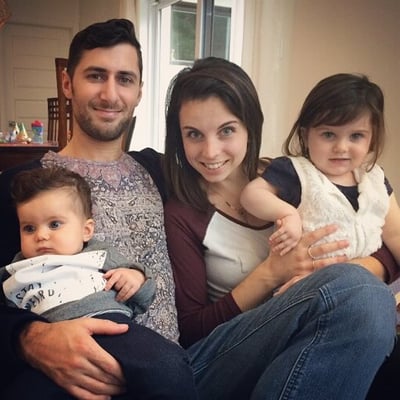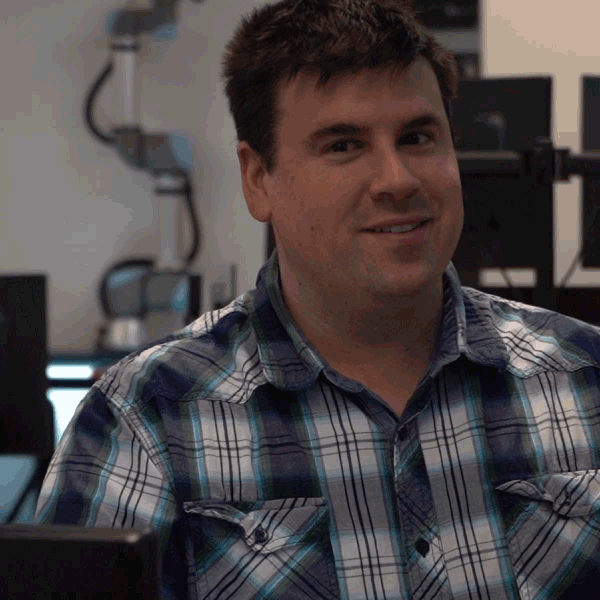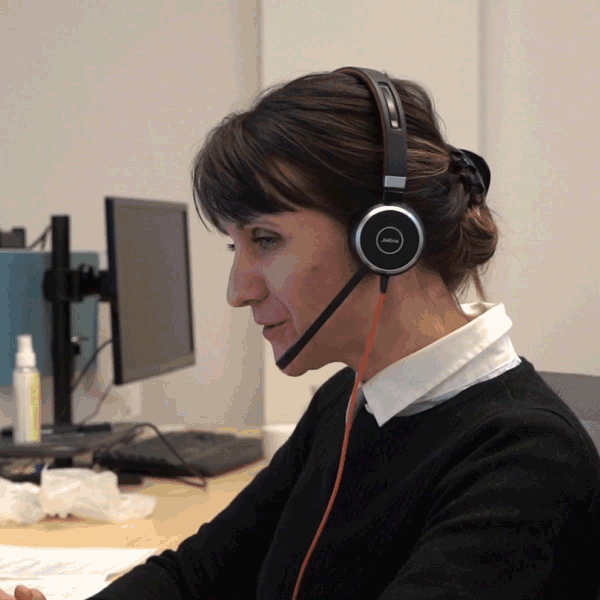A Production Coordinator, but Still a Drummer Looking for a Good, Steady Rhythm: Robotiq’s Gabriel Larivière

Posted on Feb 07, 2017 7:00 AM. 7 min read time
Gabriel Larivière, a musician and a tamer of temperamental used cars, keeps an eye on production for Robotiq. He makes sure the company that aims to make factories more efficient is holding its own in the efficiency department.
Robotiq was founded after lab-mates Samuel Bouchard, Vincent Duchaîne and Jean-Philippe Jobin decided to commercialize some of the mechatronic work they and their professor Clément Gosselin had created at Laval University in Quebec City. That was in 2008.
Today, Robotiq counts more than 40 full-time staff, and our Grippers and sensors operate in 40 different countries. We felt it was time to start telling the stories of our team members.
Between the ages of 17 and 24, Gabriel Larivière owned 13 cars, and most of them broke down at inopportune times. A frequent and unplanned destination with his clunkers was the side of the highway, his hood up and his tools out. So, it’s ironic that, with Gabriel skimping on quality in his early automobile purchases, one of the 29 year-old’s responsibilities at Robotiq would include quality control.
In his defense, that period had him saving any extra money to put toward musical equipment. He was a drummer in a band and could always use a new cymbal or tom-tom. Any needed repairs to the car, like fixing heating, changing brakes or installing a new radiator, would be learned on YouTube. He appreciates those times for giving him an ability to handle all sorts of mechanical calamity.
His dreams, and what he did with them, played a snakes and ladders game for a few years. He was always passionate about music, but it took a backseat to his dreams of becoming a cameraman. He did an internship at a television network but discovered few prospects in an industry going through layoffs. So he continued at school but that was also proving frustrating: a university engineering program had him repeating courses he had already taken in Cegep (Quebec’s junior colleges). That led him to return to Cegep for a technology program, only to see that the program he originally wanted to enroll in radically changed. No worries; he would attend part time and be very happy spending most of his time playing music and working at a hardware store. That is, until he was given the opportunity to work in a fledgling robotics company.
“I began at the bottom rung,” explains Gabriel, who was hired by Robotiq in 2011 during its early days. His tasks grew with the company and he went from assembling Grippers to becoming an electronics technician, then to taking on responsibilities for continuous improvements to where he is today, as Engineering Production Coordinator.
That progression of roles has allowed him to really understand the organization. Translated into his current job, it has him looking for the most efficient ways to manufacture products, integrating client needs into new and existing products and measuring in milestones how well the company is improving production.
Meet Gabriel Larivière: Engineering Production Coordinator

Gabriel grew up in Quebec City, the youngest of three children, with a father working at the school board and a mother employed by the government. His father was a music fanatic and was good at repairing appliances, both of which seemed to rub off on Gabriel, who took up drums in high school and developed an interest in all things electronic. While he also loved sports like soccer and badminton, high school saw his persona, a musical skater punk, emerge, replete with the tops of his boxers visible and belts well studded. His family’s basement was filled with the sounds of Gabriel’s drumming, as well as the musical efforts of his various band mates.
Those rehearsals led to gigs, but Gabriel dispels any notion that this was anything close to making it big. “These were shows in basements with low ceilings. It was very loud music for very few people.”
.jpg?width=467&name=14612629_1199289430155775_8287214479932489140_o%20(1).jpg) Nevertheless, he pursued his musical interests while working at various jobs, including his first one at a family-run garden center. “I spent long days in the sun, working hard,” recalls Gabriel. He seemed to have gained a good work ethic at both the nursery and a hardware store that followed. He also poured his earnings back into drum equipment and paying off those old cars.
Nevertheless, he pursued his musical interests while working at various jobs, including his first one at a family-run garden center. “I spent long days in the sun, working hard,” recalls Gabriel. He seemed to have gained a good work ethic at both the nursery and a hardware store that followed. He also poured his earnings back into drum equipment and paying off those old cars.
His car troubles taught him a lot about mechanical work and contributed to his troubleshooter’s patience, while his hardware job allowed him to hone some additional technical skills. “I worked for five years at the hardware store. It got me to really understand tools and how to build things.” He also amassed a network of clients, who would call on him for such things as installing a hot-water tank or changing a toilet.
His father, who had a habit of storing old electronic items, had a few VHS recorders lying around. That got Gabriel to experiment with mixing and cutting tape. “I developed a passion for video editing, doing weddings and music videos.” It also pushed his desire to pursue camera work, which led him to that internship. Unfortunately, it came during a period when a local station had just closed, with other more experienced camera operators competing for work.
“Employers had to choose between someone who had 10 years experience and me coming out of school,” said Gabriel, who was reluctant to launch into a career where he would be going from small contract to small contract. “There were a lot of students like me, who graduated and saw the job prospects and changed course.”
 He, too, changed course. Gabriel’s girlfriend, Elyse Bouchard-Vachon, knew he had a talent for electronics and convinced him to go into engineering at Laval University. Unfortunately, that only lasted a year and a half, due to the aforementioned duplication of Cegep courses. However, he also became interested in focusing on more fundamental electronics. “What was interesting to me was industrial electronics, like high-power voltage.” So, he returned to the program he had been doing two years earlier and adapted to an unexpected new program. He took part-time courses, one of which was learning robotics standards and would prove to be prophetic. He rounded out his time with work at the hardware store, lots of drumming and tending to any car repair that would come up.
He, too, changed course. Gabriel’s girlfriend, Elyse Bouchard-Vachon, knew he had a talent for electronics and convinced him to go into engineering at Laval University. Unfortunately, that only lasted a year and a half, due to the aforementioned duplication of Cegep courses. However, he also became interested in focusing on more fundamental electronics. “What was interesting to me was industrial electronics, like high-power voltage.” So, he returned to the program he had been doing two years earlier and adapted to an unexpected new program. He took part-time courses, one of which was learning robotics standards and would prove to be prophetic. He rounded out his time with work at the hardware store, lots of drumming and tending to any car repair that would come up.
During the third year of those three years of studies, he got a heads-up about a robot assembly job at Robotiq. One of his professors had recommended him. “I thought, should I go into a tech firm with an opportunity to move up or do I stay at the hardware store?” The answer seemed obvious. “I made the jump to Robotiq.” The job was a three-day-a-week internship that had him assembling machines.
Those images of Silicon Valley companies with their baristas and in-house gyms would have to be quickly erased. In 2011, Robotiq’s then 10 employees worked out of a one-room loft with plywood floors, located above a dental office. If the toaster oven and microwave were turned on at the same time, breakers would not only short circuit, but computer data could be sacrificed. The table doubled as a surface for both robot assembly and employee lunches.
“It was quite an adventure just to put together a functioning robot,” recalls Gabriel. His ideas about efficiency would be born in those days when a lost screwdriver or a lunch break could halt production.
.jpg?width=441&name=374063_10151261684305781_249894382_n%20(1).jpg) After his internship and studies, Robotiq was interested in taking Gabriel on full time. But a wanderlust appeared to temporarily take over: Gabriel and Elyse wanted to take three months to travel across Canada and the US in a van. “I was planning to come back,” he said, but he wanted to first travel with his girlfriend. Surfing California waves was high on his to-do list. He hoped that the promised job would still be available to him upon his return.
After his internship and studies, Robotiq was interested in taking Gabriel on full time. But a wanderlust appeared to temporarily take over: Gabriel and Elyse wanted to take three months to travel across Canada and the US in a van. “I was planning to come back,” he said, but he wanted to first travel with his girlfriend. Surfing California waves was high on his to-do list. He hoped that the promised job would still be available to him upon his return.
It was, and with it came greater responsibilities. "I stopped turning screws,” he says about his role as electronic technologist. He would become more involved in the overall production at the company, which was growing.
Gabriel’s ability to step back and look at the wider picture of a situation would turn into yet another new role. He often found himself thinking about production issues: he wondered how to best retain assembly workers, how a growing company can continually adapt their manufacturing processes and how to most efficiently integrate new products into the production process.
“I thought we needed to see the problems so we can avoid them,” he said. “Not to see them afterwards but to see them at the source.” He requested that a new position, called Continuous Improvement, be created. His bosses agreed and that became his job.
That role morphed into his current title of Engineering Production Coordinator. His days now have him leading a small team of engineers, who study the latest version of each product and work on how best to assemble it, as well as standardizing assembly and correcting future designs. “We ramp up the products that are being worked on and make them ready for manufacturing,” he says, adding that the team also works closely with R&D. They also stay abreast of customer comments and complaints, as well as any potential problems with materials and suppliers.
Gabriel appreciates the part he plays in the company and the challenges his bosses have given him. “They believed in me and they pushed me.” He likes to look at where the company will be in five years and what’s the best track to be on to get them there. He’s currently enrolled in a training series called Six Sigma, a process improvement program originally introduced by Motorola and used to much success in companies like General Electric.
 With his full-time job, the training course, time with Elyse and their two young children and nights reserved for practicing music and playing soccer, his plate is full. That kind of schedule has him appreciating the flexibility Robotiq offers its employees, many of whom he says are also able to make time for their passions.
With his full-time job, the training course, time with Elyse and their two young children and nights reserved for practicing music and playing soccer, his plate is full. That kind of schedule has him appreciating the flexibility Robotiq offers its employees, many of whom he says are also able to make time for their passions.
He’ll be bringing to Robotiq his Sigma Six lessons, which strive for infinitesimal percentages of production errors. And he’ll ready the company for all challenges it might face in production, so that it never finds itself stuck on the side of the highway with its hood up.






Leave a comment